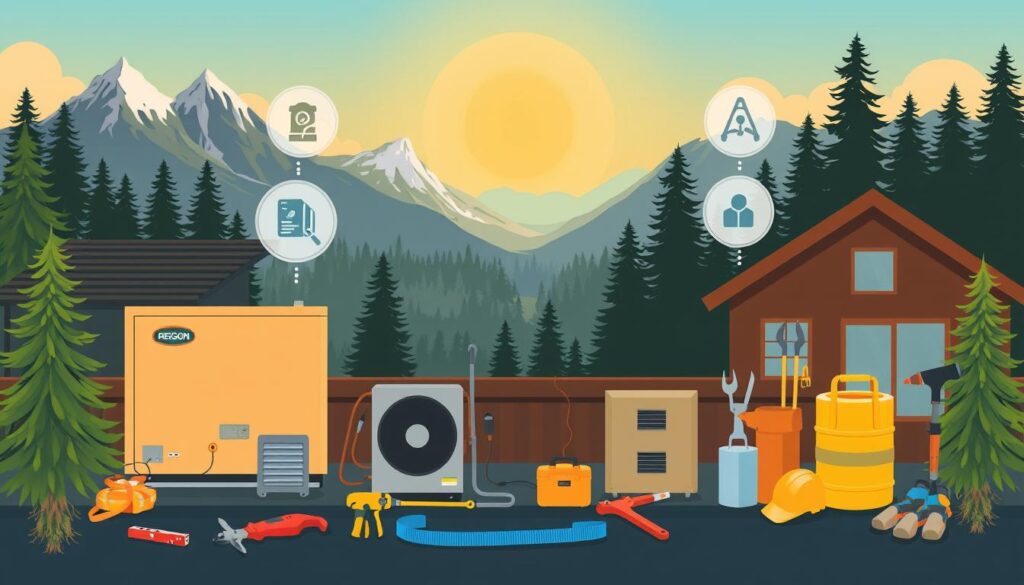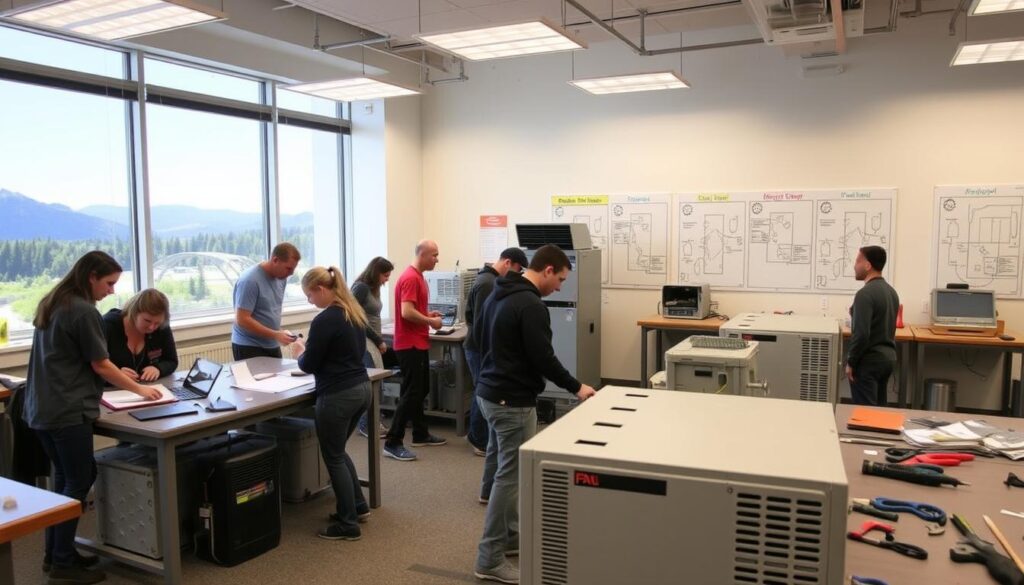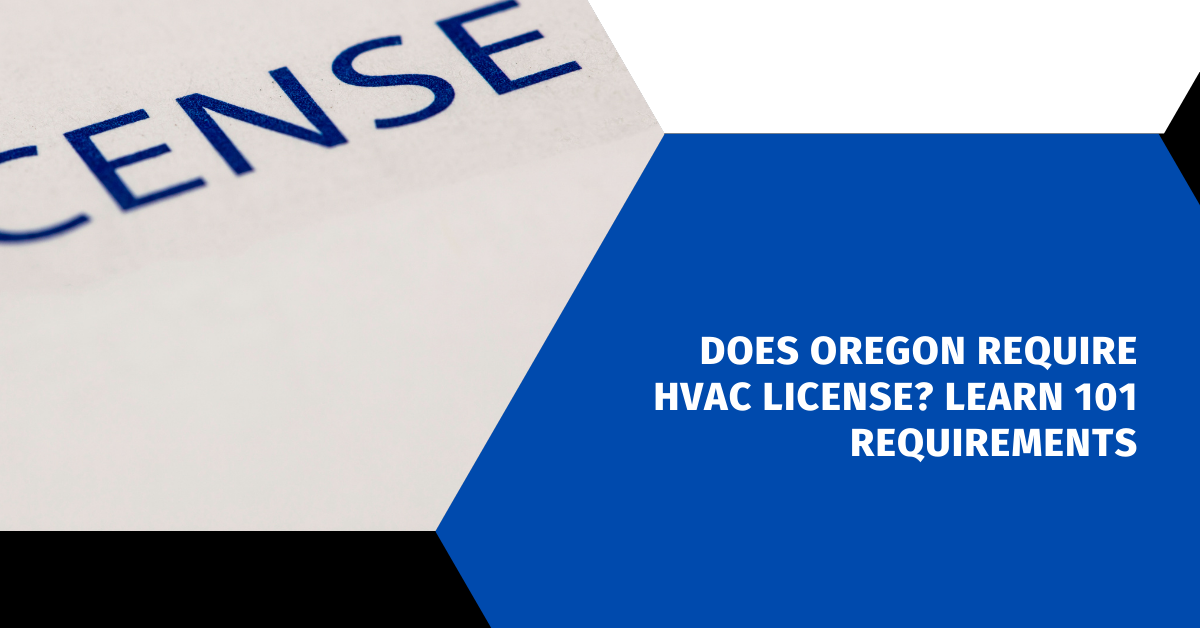Affiliate Disclosure
HVAC Guide Guys is a participant in the Amazon Services LLC Associates Program, an affiliate advertising program designed to provide a means for sites to earn advertising fees by advertising and linking to Amazon.
Did you know Oregon has about 3,960 HVAC mechanics and installers? They make up a big part of the 415,800 HVAC workers across the country. The HVAC industry in Oregon is expected to grow by 11% from 2022 to 2032. This is more than double the national average of 6%.
This fast growth shows how crucial it is to have a licensed and skilled HVAC workforce. They are needed to meet the increasing demand.

Key Takeaways
- Oregon requires HVAC technicians and contractors to be licensed by the Oregon Construction Contractors Board (CCB).
- The Oregon Building Codes Division Office (BCD) also issues specialty electrical licenses for Limited Energy Technicians.
- HVAC professionals must complete training, submit an application, and pass an exam to obtain a license, even for apprenticeship roles.
- Licensing ensures professionalism, safety, and adherence to industry standards in the HVAC industry.
- Eligibility criteria for HVAC licensing include being at least 18 years old and having the right to work in the United States.
Table of Contents
Understanding HVAC Licensing in Oregon
In Oregon, the HVAC industry is overseen by two main groups: the Oregon Construction Contractors Board (CCB) and the Building Codes Division Office (BCD). They work together to ensure HVAC services are safe, of high quality, and follow state rules.
Role of Oregon Construction Contractors Board (CCB)
The CCB handles HVAC contractor licensing and regulation in Oregon. They set standards, enforce rules, and protect consumers from bad practices. They also look into complaints and punish contractors who break the law.
Role of Building Codes Division Office (BCD)
The BCD deals with specialty electrical licenses, like the Limited Energy Technician ones needed for some HVAC work. They check if technicians are qualified and follow Oregon’s building codes and safety rules.
Importance of State Regulations
Oregon’s strong HVAC licensing and rules help keep the industry honest, protect people, and ensure quality services. By making sure HVAC pros have the right licenses and follow rules, Oregon aims to keep everyone safe, save energy, and build trust in HVAC services.
| Licensing Requirement | Details |
|---|---|
| Commercial and Residential Contractor License | Obtained through the Oregon Construction Contractors Board, requiring a 16-hour pre-license training course and passing the licensing exam. |
| Limited Maintenance Specialty Contractor – HVAC/R | Obtained through the Building Codes Division, with a license cost of $75 and a renewal required after three years. |
| Limited Energy Technician Licenses | Class A requires 6,000 hours of experience, while Class B requires 4,000 hours. |
Getting the right oregon hvac licensing board and hvac contractor license oregon is key for HVAC pros to work legally in Oregon and serve consumers.
Explore Our HVAC Shop
Looking for top-rated HVAC tools, parts, and accessories? Visit our shop and find the perfect solution for your needs.
Visit the ShopTypes of HVAC Licenses Available in Oregon
Oregon has different HVAC licenses to keep heating, ventilation, and air conditioning (HVAC) work safe and quality. The main types are the Class A Limited Energy Technician license, the Class B Limited Energy Technician license, and the Limited Maintenance Specialty Contractor HVAC/R license.
Class A Limited Energy Technician License
The Class A Limited Energy Technician license lets HVAC techs work on many systems. This includes communication, signaling, and control systems. To get this license, techs must work for a licensed contractor or in an industrial setting.
Class B Limited Energy Technician License
The Class B license is similar to the Class A but doesn’t cover signaling systems. HVAC techs with this license can work on communication and control systems.
Limited Maintenance Specialty Contractor HVAC/R
The Limited Maintenance Specialty Contractor HVAC/R license is for companies that service HVAC/R systems. It lets businesses legally work on these systems in Oregon.
| License Type | Scope of Work | Requirements |
|---|---|---|
| Class A Limited Energy Technician | Communication systems, signaling systems, and specialized control systems | Work for a limited energy contractor, electrical contractor, or single industrial employer |
| Class B Limited Energy Technician | Communication systems and specialized control systems (excluding signaling systems) | Work for a limited energy contractor, electrical contractor, or single industrial employer |
| Limited Maintenance Specialty Contractor HVAC/R | Maintain, service, repair, or replace commercial and industrial electrical products related to HVAC/R systems | $75 license fee, no exam required, 3-year renewal |
These licenses in Oregon make sure oregon hvac technician license holders can work safely and well. Knowing the hvac license oregon rules is key for HVAC pros and homeowners.
Does Oregon Require HVAC License for Technicians?
In Oregon, HVAC technicians need a license to work on heating, ventilation, and air conditioning systems. This includes installation, maintenance, and repairs. Even apprentice technicians must register with the state.
HVAC work in Oregon is considered electrical limited energy technician licenses. This applies to systems with 100 volt-amperes or less. To get a license, technicians must finish training, apply, and pass an exam. Working without a license is against the law in Oregon.
- Oregon requires HVAC technicians to be licensed, even for apprentices who must be registered with the state.
- HVAC work is categorized under electrical limited energy technician licenses for systems 100 volt-amperes or less.
- Technicians must complete training, submit an application, and pass an exam to obtain a license.
- Operating without a license is illegal in Oregon.
The rules for does oregon require hvac license and oregon hvac license requirements are in place for safety and quality. Oregon wants to protect consumers and HVAC workers. This is done by requiring proper training and certification.
Explore Our HVAC Shop
Looking for top-rated HVAC tools, parts, and accessories? Visit our shop and find the perfect solution for your needs.
Visit the ShopEducational Requirements and Training Programs
To become an HVAC technician in Oregon, you have several options. Many people choose approved apprenticeships or technical schools. These offer specialized HVAC training.
Approved Apprenticeship Programs
The Bureau of Labor & Industries lists approved apprenticeships. These include Class A and Class B Limited Energy Technician (LEA and LEB) licenses. Apprenticeships mix on-the-job training with classroom learning. This way, you get practical experience while earning your license.
Technical Schools and Community Colleges
Several schools in Oregon offer HVAC training. Lane Community College, Northwest College of Construction, Clackamas Community College, and Chemeketa Community College are some examples. These programs give you the classroom hours and skills needed for the HVAC industry.
Required Classroom Hours
The hours needed for HVAC licensing in Oregon depend on the license type. Class A needs 432 hours, while Class B requires 288 hours.

Choosing any approved HVAC training program is key to becoming a qualified technician in Oregon. With the right education and certification, you’re set for a fulfilling career in this growing field.
Experience Requirements for Licensing
To get an HVAC license in Oregon, you must meet certain experience needs. The hvac license requirements oregon change based on the license type you want.
For a Class A Limited Energy Technician license, you need 6,000 hours of verified work experience. This experience must be legal and confirmed by your employer.
For a Class B Limited Energy Technician license, you need 4,000 hours of verified work. Or, you can finish an approved apprenticeship program for both Class A and Class B licenses.
If your experience is from outside Oregon, the rules are a bit different. A Class A license needs 12,000 hours of verified work. A Class B license needs 8,000 hours.
These experience rules make sure HVAC technicians in Oregon are skilled and knowledgeable. Meeting these standards shows you’re ready for your HVAC license. It’s a big step towards your career goals.
Explore Our HVAC Shop
Looking for top-rated HVAC tools, parts, and accessories? Visit our shop and find the perfect solution for your needs.
Visit the ShopHVAC License Application Process
To get an HVAC license in Oregon, you must follow a specific process. First, you need to fill out the electrical license application. This form asks for your work history and qualifications.
You also have to pay a $50 application fee to the Department of Consumer & Business Services. After your application is okayed, you’ll get a letter. This letter lets you book your exam within 60 days.
Required Documentation
- Completed electrical license application
- Work history and qualifications
- $50 application fee
Application Fees and Timeline
The cost for an hvac license application oregon is $50. You pay this to the Department of Consumer & Business Services. Once approved, you have 60 days to book and take the exam.
Testing Locations
For the exam, you can pick from 10 locations in Oregon. This makes it easier to find a spot that works for you. It also makes the oregon hvac license fees process more convenient.
The application process is the same for both Limited Energy Technician (LEA) and Limited Energy Technician (LEB) licenses. Knowing what’s needed helps you navigate the process smoothly. This way, you can get your HVAC license in Oregon without any hitches.
Examination Process and Requirements
To get an HVAC license in Oregon, you must pass a licensing exam. The exams for Limited Energy Technician Class A (LEA) and Limited Energy Technician Class B (LEB) are open-book. This means you can look at approved materials while taking the test.
When you go to the testing site, remember to bring your letter of authorization, a valid photo ID, and any approved materials. The LEA exam gives you three hours, and the LEB exam gives you two hours. You need to score 75% or higher to pass.
The exam results will be sent to you within two weeks. If you pass, you’ll get your HVAC license and a notification. If you fail, you can retake the exam after 30 days. You’ll need to use the provided reapplication form.
| Exam | Time Limit | Passing Score |
|---|---|---|
| Limited Energy Technician Class A (LEA) | 3 hours | 75% or higher |
| Limited Energy Technician Class B (LEB) | 2 hours | 75% or higher |
Remember, the hvac license exam oregon and oregon hvac license test are key steps to work as an HVAC technician in Oregon. Knowing the exam process and requirements helps you prepare. It’s the first step towards a rewarding career in the HVAC industry.
Explore Our HVAC Shop
Looking for top-rated HVAC tools, parts, and accessories? Visit our shop and find the perfect solution for your needs.
Visit the ShopLicense Renewal and Continuing Education
As an HVAC pro in Oregon, keeping your license current is key. Oregon requires HVAC licenses to be renewed to keep up with new industry standards. You’ll need to finish continuing education courses, which depend on your license type.
For hvac license renewal oregon, the number of education credits and approved courses can change. Always check with the Oregon Construction Contractors Board (CCB) or the Building Codes Division Office (BCD) for the latest rules. These courses show you’re dedicated to your career and committed to excellent service for your clients.
Keeping up with oregon hvac continuing education is important. It keeps your license active and keeps you updated on the latest in HVAC. This knowledge helps you offer the best services and solutions to your customers.
| License Type | Continuing Education Requirements |
|---|---|
| Journeyman Electrician | 24 hours of continuing education per renewal period |
| Limited Residential Electrician | 16 hours of continuing education per renewal period |
| Residential Contractor | 8 hours of continuing education every two-year license period if licensed for 6 years or more |
| Commercial Contractor | 16 to 80 hours of continuing education, depending on the number of key employees in the business |
By keeping up with hvac license renewal oregon and oregon hvac continuing education needs, you keep your license valid and your skills sharp. This dedication benefits you and your clients, who can rely on your expertise and quality work.

Career Opportunities and Salary Expectations
Working as an HVAC professional in Oregon is rewarding. You’ll see job growth and earn competitive salaries. The U.S. Bureau of Labor Statistics reports 3,960 HVAC mechanics and installers in Oregon, making an average of $63,970 a year.
Job Growth Projections
The job outlook for HVAC technicians in Oregon is bright. Employment is expected to grow 11% by 2032, beating the national average. This increase is due to the need for better heating, ventilation, and air conditioning systems in homes and businesses.
Average Salary in Oregon
HVAC installers in Oregon make about $29.78 an hour. HVAC technicians earn $32.20 an hour. With overtime, they can earn up to $6,750 extra each year, making their salary quite comfortable.
Career Advancement Options
As you gain more experience, you can move up in your career. You might become a Limited Maintenance Specialty Contractor HVAC/R. Getting specialized certifications in areas like commercial HVAC or advanced refrigeration can also increase your earnings.
The HVAC industry in Oregon is stable and offers good pay. With the right training and certifications, you can have a successful career in this field.
Explore Our HVAC Shop
Looking for top-rated HVAC tools, parts, and accessories? Visit our shop and find the perfect solution for your needs.
Visit the ShopConclusion
Understanding Oregon’s HVAC licensing rules is key for those in this vital field. Knowing the Oregon Construction Contractors Board (CCB) and Building Codes Division Office (BCD) helps you follow state laws. This ensures you get the right licenses and certifications.
Whether you aim for a Class A or Class B Limited Energy Technician License, or a Limited Maintenance Specialty Contractor HVAC/R, there’s a path. You need to finish approved training, get practical experience, and pass exams.
The need for certified HVAC experts in Oregon is rising. This creates great job chances with good pay. Getting the right licenses shows you’re skilled, committed to quality, and always learning.
Employers in HVAC want technicians who meet Oregon’s licensing standards. This means they have the skills to work with complex heating systems.
By keeping up with Oregon’s HVAC licensing steps and using resources like the Oregon Construction Contractors Board (CCB) and Northwest Heating Association (NHA), you’re set for success. Whether starting or growing in your HVAC career, knowing the rules is essential for reaching your goals.

